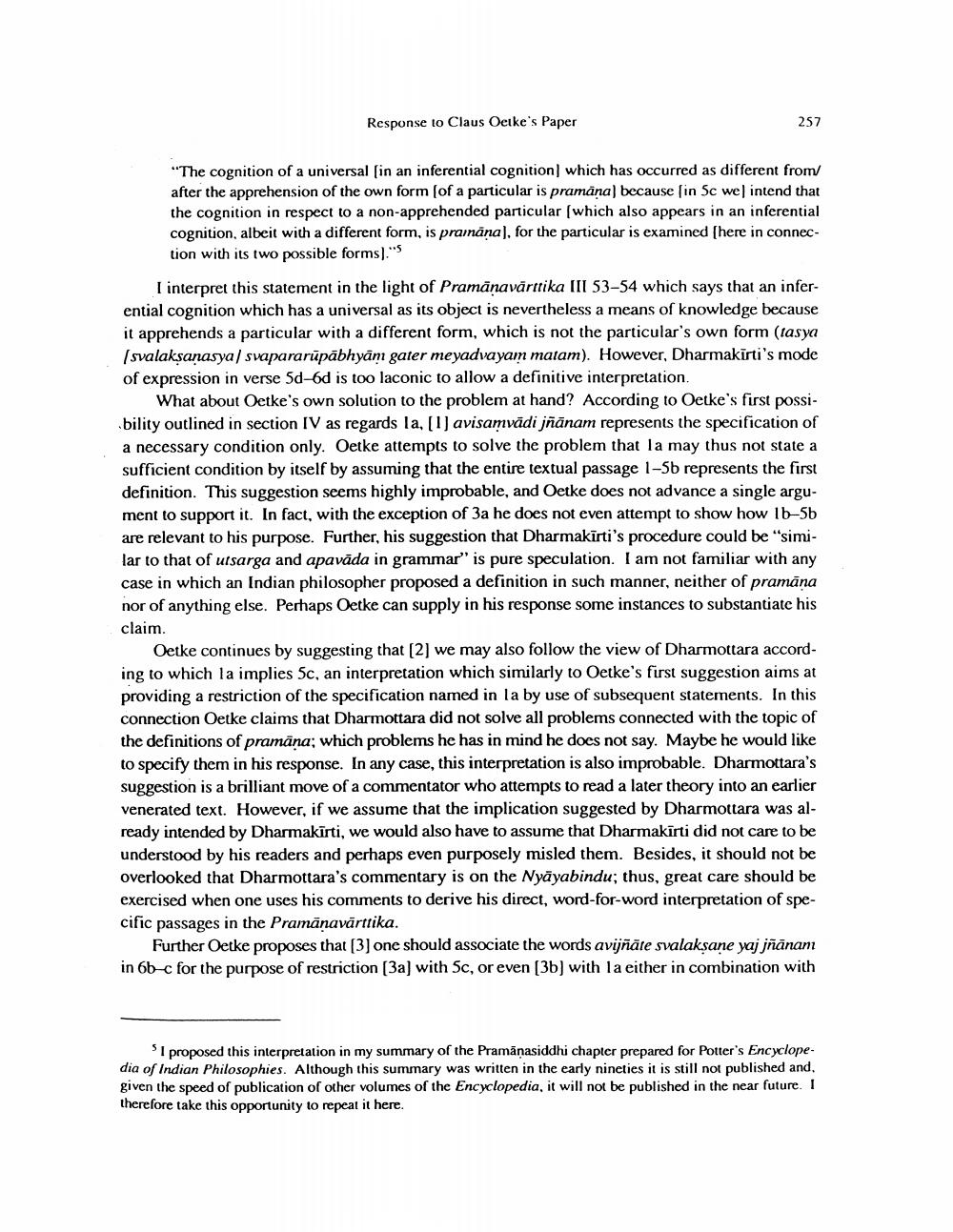Book Title: Response To Claus Obteks Paper Author(s): Eli Franco Publisher: Eli Franco View full book textPage 5
________________ Response to Claus Oetke's Paper 257 "The cognition of a universal (in an inferential cognition which has occurred as different from after the apprehension of the own form (of a particular is pramana) because in Sc wel intend that the cognition in respect to a non-apprehended particular (which also appears in an inferential cognition, albeit with a different form, is praināna), for the particular is examined (here in connection with its two possible forms). I interpret this statement in the light of Pramānavārttika III 53-54 which says that an inferential cognition which has a universal as its object is nevertheless a means of knowledge because it apprehends a particular with a different form, which is not the particular's own form (tasya (svalaksanasya) svapararūpābhyām gater meyadvayam malam). However, Dharmakirti's mode of expression in verse 5d-6d is too laconic to allow a definitive interpretation. What about Oetke's own solution to the problem at hand? According to Oetke's first possi.bility outlined in section IV as regards la (1) avisamvādi jñānam represents the specification of a necessary condition only. Oetke attempts to solve the problem that la may thus not state a sufficient condition by itself by assuming that the entire textual passage 1-5b represents the first definition. This suggestion seems highly improbable, and Oetke does not advance a single argument to support it. In fact, with the exception of 3a he does not even attempt to show how 1b-5b are relevant to his purpose. Further, his suggestion that Dharmakīrti's procedure could be "similar to that of utsarga and apavāda in grammar" is pure speculation. I am not familiar with any case in which an Indian philosopher proposed a definition in such manner, neither of pramāna nor of anything else. Perhaps Oetke can supply in his response some instances to substantiate his claim. Oetke continues by suggesting that (2) we may also follow the view of Dharmottara according to which la implies 5c, an interpretation which similarly to Oetke's first suggestion aims at providing a restriction of the specification named in la by use of subsequent statements. In this connection Oetke claims that Dharmottara did not solve all problems connected with the topic of the definitions of pramāna; which problems he has in mind he does not say. Maybe he would like to specify them in his response. In any case, this interpretation is also improbable. Dharmottara's suggestion is a brilliant move of a commentator who attempts to read a later theory into an earlier venerated text. However, if we assume that the implication suggested by Dharmottara was already intended by Dharmakīrti, we would also have to assume that Dharmakirti did not care to be understood by his readers and perhaps even purposely misled them. Besides, it should not be overlooked that Dharmottara's commentary is on the Nyāyabindu; thus, great care should be exercised when one uses his comments to derive his direct, word-for-word interpretation of specific passages in the Pramänavärtrika. Further Oetke proposes that (3) one should associate the words avijñāte svalaksane yaj jñānam in 6b-c for the purpose of restriction (3a) with 5c, or even (3b) with la either in combination with SI proposed this interpretation in my summary of the Pramānasiddhi chapter prepared for Potter's Encyclopedia of Indian Philosophies. Although this summary was written in the early nineties it is still not published and, given the speed of publication of other volumes of the Encyclopedia, it will not be published in the near future. I therefore take this opportunity to repeat it here.Page Navigation
1 ... 3 4 5 6 7
